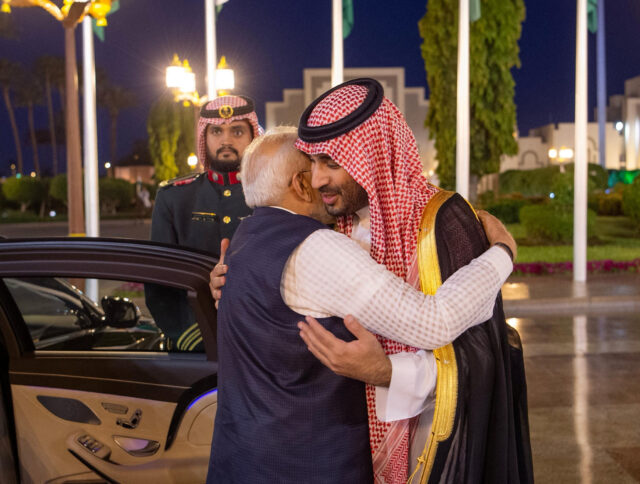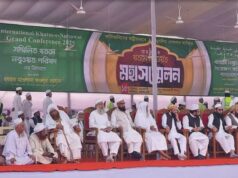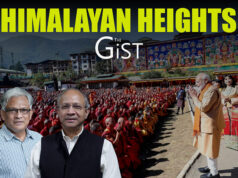
“I want to go back to my home now in India. But this is also my home where I came as a wife but will be going back alone,” says Zeenat Mussarat Jafri, dressed in a pink abaya while proudly brandishing the Pravasi Bharatiya Samman which was conferred on her by former President Pranab Mukherjee in 2017.
Jafri, now in her late 70s, landed in Saudi Arabia in 1976 as a newly-wed bride accompanying her husband, who was then working at the Defence Research and Development Organisation (DRDO). Little did she know then that one day she would be recognised by both India and Saudi Arabia for her exemplary work in providing premiere education to the children of Indian expatriates.
“In 1976, when I first came here, Saudi Arabia was a completely different country. I came from a country where I used to go to my college alone, I used to drive around my locality alone. But when I came here I realised there were so many restrictions on women. But still I was determined to do something in the field of education here.
“I used to see there were American schools, British schools, French schools and others but no Indian schools. And since fees were very high, most of the Indian expatriates were forced to work here leaving their children behind,” Jafri told StratNewsGlobal while having chicken soup at the Indian Garden Restaurant in Riyadh.
Jafri decided to open her own school in Riyadh and approached former Prime Minister Indira Gandhi, who was on a visit to the Saudi capital in 1982, to speak to the authorities there and grant her permission to open a school. Thus began her journey.
In 1982 she started the first Indian school in Saudi Arabia called International Indian School with just 20 students which has now grown to 1,200 and is currently a renowned CBSE-affiliated school in Riyadh.
“When we began, we were careful of the fact that boys and girls students will be sitting in separate blocks. PM Gandhi also instructed the Indian Embassy to help us out any whichever way possible. I was educated from Jammu and Kashmir University. I went door-to-door asking families to send their children to our school,” she said.
Jafri, who will be soon completing five decades in the kingdom, said while Saudi Arabia has undergone a rapid change in the last 50 years, Riyadh’s bilateral ties with New Delhi have also grown by leaps and bounds. “I am happy that I was able to contribute in my own way in this growth,” she said.
Talib Ur Rehman, Deputy Convener of Indian Diaspora in Riyadh, came to Saudi Arabia in January 1983 to work at the King Fahad Air Base in Taif near Mecca. Rehman worked there for seven years after which he relocated to Riyadh.
“Despite being an Indian they put trust in me to work in such sensitive areas… After that I opened my own company and since then I call Saudi Arabia my home but I am always an Indian first. I always hire Indians in my company, which is mostly working on government projects. I feel it is my duty to bring in more and more talent from India and I get the support of the Saudi government in doing this,” said Rehman, who is now Deputy Managing Director of the Al Hada Group.
Rehman, who has been living in the kingdom for the past 43 years, continues to remain an Indian citizen while his children have obtained citizenship. Rehman’s son-in-law, who is a doctor by profession, has been able to obtain ‘Premier Citizenship’ which has given him equal rights as an ordinary Saudi citizen.
“Indian expatriates enjoy maximum benefits in Saudi Arabia. This is the reason why so many of us have stayed back in this country. Saudis fully trust Indians. As an Indian we feel proud that we have been able to make a mark for ourselves here and contribute in the growth of bilateral ties,” said Rehman who came to Saudi Arabia alone but eventually he brought his wife and thereafter they had five children, all of whom were born in the kingdom.
The Indian diaspora in Saudi Arabia is a large community, with approximately 2.75 million people, making it one of the largest. The community significantly contributes to the Saudi economy through professional services, IT, and various other sectors, with the Indian government and diaspora leaders referring to them as a “living bridge” between the two nations.
When Nadim Tarin, 65, an engineer by training came to Saudi Arabia in the 1980s he was told he was going to a place which is going to be extremely hot and humid. But after reaching Saudi Arabia, Tarin realised that desert evenings can get very cold. So the first item that Tarin bought in Saudi Arabia after arriving here was a coat.
Tarin did civil engineering from Aligarh University. “I was fortunate enough to land a job here. At that time one was allowed to come into this country only if they had a job in hand. That was a very tough time for me. Life was very difficult in the 1980s, be it in India or be it in Saudi Arabia.
“I, eventually, left my job and opened my own company here. We were given a lot of support by the Saudi government and we also had the support of the Indian Embassy. But at that time Saudi society was highly orthodox and religiosity was very high. Even women coming from countries like India had to follow strict rules. But now all that is gone. My wife has her own school, women can drive, they can own businesses. It is a different country now,” he said.
Indian families live in residential compounds in major cities like Riyadh and Jeddah. There are embassy-run schools that cater to the educational needs of Indian children, although there are ongoing discussions within the community about the need for more resources and options for higher education, especially in specialized fields like medicine.
Saudi Arabia now has a plethora of Indian schools which are affiliated to the Central Board of Secondary Education (CBSE). However, the only subjects that are mandatory in the syllabus in the kingdom are Saudi Arabian history and Arabic language.
‘Initially it was difficult to have a standalone school in Saudi Arabia dedicated only to Indian students… But today, there are many schools in not only Saudi Arabia but in the Gulf that are affiliated to the CBSE,” said Mairaj Mohd Khan, Principal of Daratassalam International, Delhi Public School, Riyadh, which boasts of over 2,000 students.
“The Ministry of Education in Saudi Arabia does not interfere with the CBSE syllabus so we have full freedom in that. Since 2017 of course as Saudi society has opened up, we have seen a visible change in the education sector. We now employ more and more women teachers and they have turned out to be excellent,” he said.




